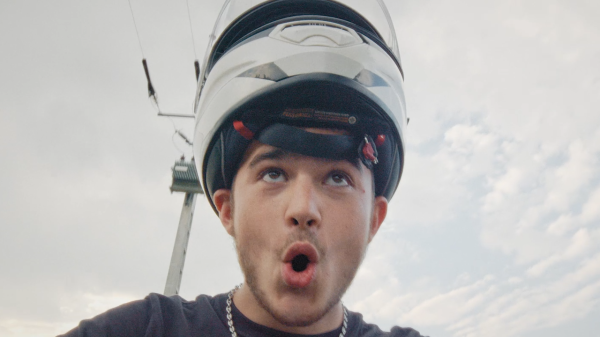
Save this storySave this storySave this storySave this story
Damien and Marc Bettinelli’s film follows the stock-car racers Pierryck and Gaspard Dumont, in France.
“Can you pass me the nineteen key?” a man in a garage barks to his companion, as they both tinker with a car’s underbelly. “This one doesn’t fit.” The mechanics are a weathered amateur stock-car racer named Pierryck Dumont and his eighteen-year-old son Gaspard. “Supernova,” a début documentary short from the French filmmakers Damien and Marc Bettinelli, centers on the father and son, who are setting out to compete against each other on the racetrack for the first time. Just about a minute into the film, the patriarch delivers a line that captures the paradox at the heart of their story. A month before the race, as his impish challenger goofs around in a grocery store, and rides the shopping cart like a scooter, the elder Dumont says, off camera, “My objective, obviously, is that he doesn’t succeed.”
It’s obviously a joke. In the opening scene, when father and son fix a banged-up Renault 5 GTL at night in the family’s garage, the sputtering of an old radio set, hammer blows, and rattling sounds from a thousand wrenches do most of the talking, but the bond between them is palpable. Pierryck, a stock-car-racing fanatic and inveterate daredevil—he picked 808 as his competition number so that it could be read upside down when his car rolls over—takes unmistakable pride in Gaspard following in his footsteps. Nothing would make him happier, one senses, than seeing his son succeed in his amateur racing career, even if that means being surpassed himself.
At the same time, there is a bitter truth baked into Pierryck’s quip. Keeping a tradition alive, family or otherwise, means passing along expertise, in recognition of the reality that sooner or later the older generation will no longer be there. Transmission is—literally—a consensual form of passing. For Pierryck, the thrill of his son’s ascendence comes with the unwelcome knowledge that he will become obsolete. Such ambivalence—the selfless desire and unspoken fear of being eventually outmatched by one’s own children—is at the heart of parental love and its complexities. And judging from the slew of shiny trophies displayed on his shelves, his ferocious handling of blowtorches, tooth ratchets, and circular saws—he is not quite ready yet to call it quits.
Pierryck has a tough-love, no-eye-contact, proletarian kind of virility; what makes his comment so moving is that it seems clear that playfully wishing his son to fail is his way of cheering him on. A factory worker, Pierryck lives in a village near the city of Saint-Étienne, in a largely deindustrialized area, in eastern-central France, steps away from where Damien and Marc Bettinelli, the co-directors and twin brothers behind “Supernova,” grew up. “In this working-class milieu,” Marc told me over Zoom, “many things are left unsaid.” Opening up, for instance, does not come naturally. A rotund figure who speaks with an accent steeped in that area, Pierryck has a knack for swearing (“I sleep, eat, and shit stock-car racing,” he once told the Bettinelli brothers). “Behind his somewhat coarse humor and festive temperament, he is very modest,” Marc told me. “It’s the slap-on-the-back trope: you say ‘dumbass’ to avoid saying ‘I love you.’ ”
The way Pierryck communicates his emotions reminded the Bettinellis, who now live in Paris and both work in media, of their own father. “It was moving for us to set up a rather brutal and rustic environment against a father-son relationship,” Damien, the other twin, told me. (He focusses on cinematography; Marc focusses on the storytelling.) Amateur stock-car racing, he pointed out, matches the kind of genial, white blue-collar culture that the Dumonts are a part of. Every Sunday race is an opportunity for the drivers, their families, and their friends to congregate outdoors and party late into the night under large tents in the barbecue smoke. Heineken beer bottles are always within reach. And sausages seem infused with the metaphysical power of great religions. “But it is a culture endangered by economic hardship and the loss of industrial jobs,” Damien added. For now, though, father and son carry on with the tradition. “I’m very proud of him,” Pierryck ultimately confesses. “But I’m not going to tell him because I’m afraid he’ll get a big head.” ♦
Sourse: newyorker.com






